1. Overview
Maria Gloria Macaraeg Macapagal-Arroyo, often referred to as PGMA or GMA, is a Filipino academic and politician who served as the 14th President of the Philippines from 2001 to 2010. She holds the distinction of being the longest-serving president since Ferdinand Marcos. Prior to her presidency, she was the 10th Vice President of the Philippines from 1998 to 2001 under President Joseph Estrada, becoming the first woman to hold that office. She also served as a Senator of the Philippines from 1992 to 1998.
Arroyo is the first president to succeed to the presidency as the child of a previous president, her father being Diosdado Macapagal, the country's ninth president from 1961 to 1965. An economist by profession, she taught at various universities before entering government service. Her ascent to the presidency in 2001 followed the Second EDSA Revolution, a bloodless coup that ousted President Joseph Estrada amid widespread corruption allegations. She was subsequently elected to a full six-year term in the controversial 2004 presidential election.
After her presidency, Arroyo continued her public service, being elected as the representative for Pampanga's 2nd congressional district in 2010, a role she continues to hold. She also served as the Speaker of the House from 2018 to 2019, making her the first female Speaker, and held positions as deputy speaker at various times. Throughout her career, Arroyo has faced numerous legal challenges and controversies, including allegations of electoral fraud and misuse of state funds, which led to her hospital arrest and eventual acquittal by the Supreme Court of the Philippines. Her political career is marked by significant economic reforms, efforts at constitutional change, and a fluctuating public perception.
2. Early Life and Background
Gloria Macapagal-Arroyo's early life was shaped by her family's prominent political background and her extensive academic pursuits.
2.1. Early Life and Education
Maria Gloria Macaraeg Macapagal was born on April 5, 1947, at St. Luke's Medical Center Extension Clinic in Ermita, Manila, Philippines. Her parents were Diosdado Macapagal, a lawyer and politician who would later become the ninth President of the Philippines, and Evangelina Guico Macaraeg Macapagal. She is the sister of Diosdado "Boboy" Macapagal Jr. She also has two older half-siblings from her father's first marriage with Purita de la Rosa: Arturo Macapagal and Cielo Macapagal Salgado.
She spent most of her childhood in Lubao, Pampanga, and during summer vacations, she lived with her maternal grandmother in Iligan City. When she was 14, her father was elected president in 1961, and her family moved into Malacañang Palace in Manila. A municipality in Oriental Mindoro was later named in her honor, Gloria, Oriental Mindoro.
Arroyo attended Assumption Convent for her elementary and high school education, graduating as valedictorian in 1964. She then pursued higher education for two years at Georgetown University's Walsh School of Foreign Service in Washington, D.C., where she was a classmate of future United States president Bill Clinton. She consistently appeared on the Dean's List during her time there. She completed her Bachelor of Arts degree in Economics from Assumption College San Lorenzo, graduating magna cum laude in 1968.
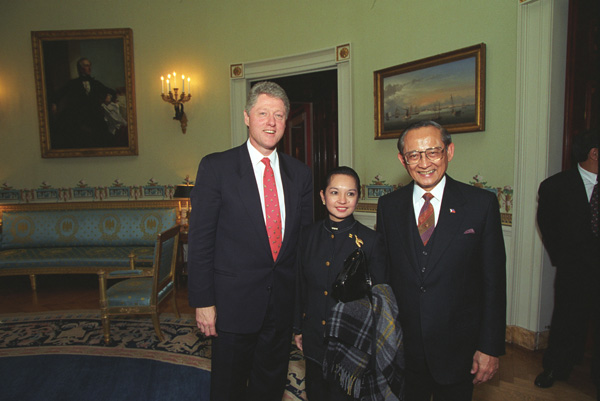
3. Early Career and Entry into Politics
Following her undergraduate studies, Gloria Macapagal-Arroyo embarked on a career as an economist and professor before transitioning into public service. She earned a master's degree in economics from the Ateneo de Manila University in 1978 and a Ph.D. in economics from the University of the Philippines Diliman in 1985.
From 1977 to 1987, she held teaching positions at several academic institutions, including the University of the Philippines and the Ateneo de Manila University. She also served as the chairperson of the Economics Department at Assumption College.
In 1987, President Corazon Aquino invited Arroyo to join the government as assistant secretary of the Department of Trade and Industry. Her contributions in expanding textile trade were recognized, leading to her promotion to undersecretary two years later. In her concurrent role as executive director of the Garments and Textile Export Board, Arroyo played a significant part in overseeing the rapid growth of the garment industry in the late 1980s.
4. Senator (1992-1998)
Gloria Macapagal-Arroyo entered the political arena in the 1992 Philippine Senate election, running for a seat in the Senate of the Philippines. In the first general election held under the 1987 Constitution, the top twelve senatorial candidates would secure a six-year term, while the next twelve would serve a three-year term. Arroyo ranked 13th in the elections, earning her a three-year term. She was subsequently re-elected in the 1995 Philippine Senate election, topping the senatorial election with nearly 16 M votes, marking the highest number of votes ever obtained by any politician for any position in Philippine election history at that time.
As a legislator, Arroyo was highly active, filing over 400 bills and authoring or sponsoring 55 significant laws during her tenure as senator. These included the Anti-Sexual Harassment Law, the Indigenous People's Rights Law, and the Export Development Act. However, the 1995 Mining Act, which permits 100% foreign ownership of Philippine mines, drew criticism from left-wing political groups. Arroyo was also an outspoken opponent of the implementation of capital punishment in the country, advocating instead for improved criminal rehabilitation during her time in the Senate.
5. Vice President (1998-2001)
In the lead-up to the 1998 Philippine general election, Gloria Macapagal-Arroyo considered a presidential bid. However, she was persuaded by then-President Fidel V. Ramos and leaders of the ruling Lakas-NUCD party to instead seek the vice-presidency as the running mate of their presidential candidate, House Speaker Jose de Venecia, Jr.. Despite de Venecia's loss to the popular former actor Joseph Estrada, Arroyo secured a decisive victory in the vice-presidential race, garnering more than twice the votes of her closest opponent, Estrada's running mate Senator Edgardo Angara. This made her the first female Vice President of the Philippines.
Arroyo commenced her term as vice president on June 30, 1998. President Estrada appointed her to a concurrent position in the cabinet as Secretary of Social Welfare and Development. In this role, her primary responsibility was to oversee the government's social programs aimed at assisting the poor. Political observers noted her consistent neutral stance on government issues during this period. She was also recognized as the "economic vice president" for her efforts in promoting economic openness, attracting foreign investment, and supporting the country's accession to the World Trade Organization (WTO).
In October 2000, Arroyo resigned from the Cabinet, distancing herself from President Estrada, who was facing accusations of corruption from a former political ally, Chavit Singson, the Governor of Ilocos Sur. Initially, she resisted pressure from her allies to speak out against Estrada, but she eventually joined the growing calls for his resignation.
6. Presidency (2001-2010)
Gloria Macapagal-Arroyo's presidency was a period of significant political and economic shifts in the Philippines, marked by both policy reforms and numerous controversies.
6.1. Succession and EDSA II
The final quarter of 2000 and the first week of January 2001 were characterized by intense political and economic uncertainty in the Philippines. On January 16, 2001, the impeachment trial of President Joseph Estrada took a dramatic turn when private prosecutors walked out of the proceedings. This occurred after pro-Estrada senators prevented the opening of a brown envelope, which allegedly contained bank records belonging to the President. With the walkout, the impeachment trial stalled, prompting hundreds of thousands of Filipinos to take to the streets in mass protests demanding Estrada's resignation.
From January 17 to 20, 2001, large crowds gathered at Epifanio de los Santos Avenue (EDSA), the historic site of the original People Power Revolution. This movement, known as EDSA II, gained significant momentum as various sectors of Philippine society-including professionals, students, artists, politicians, and both leftist and rightist groups-joined the calls for a change in leadership. Crucially, officials from the administration, the Armed Forces of the Philippines (AFP), and the Philippine National Police (PNP), led by Panfilo Lacson, publicly withdrew their support for President Estrada.

On January 20, 2001, with widespread support and the military's backing, the Supreme Court of the Philippines declared the presidency vacant. Chief Justice Hilario Davide Jr. then administered the oath of office to Gloria Macapagal-Arroyo, swearing her in as the 14th President of the Philippines. This marked the second time in Philippine history that a president assumed office through a "People Power" revolution, following Corazon Aquino.
Days after Estrada left Malacañang Palace, his lawyers and allies challenged the legitimacy of Arroyo's presidency before the Supreme Court, with Senator Miriam Defensor Santiago being among the most vocal politicians advocating for Estrada's reinstatement. Estrada himself asserted that he had not officially resigned and that Arroyo was, at most, serving in an acting capacity. However, the Supreme Court unanimously voted to uphold the legitimacy of Arroyo's succession. As a consequence, Estrada lost his immunity from charges.
In the last week of April 2001, the Sandiganbayan (anti-graft court) ordered the arrest of Estrada and his son, then-mayor Jinggoy Estrada, on plunder charges. In response, thousands of Estrada supporters gathered at the EDSA Shrine a few days later, staging what they called EDSA III, drawing comparisons to the 1986 and January 2001 People Power revolutions. Protesters demanded Estrada's release and Arroyo's ouster. On May 1, 2001, the demonstrators marched towards Malacañang Palace, attempting to storm it. Violence erupted, and the military and police were ordered to disperse them. Arroyo declared a state of rebellion due to the violence, leading to the charging and arrest of prominent political figures affiliated with Estrada. This "EDSA III" was the first serious political challenge to the Arroyo presidency.
6.2. First Term (2001-2004)

During her first term, President Arroyo faced significant domestic challenges and implemented key policy decisions.
6.2.1. Major Events and Policies
On July 27, 2003, the Oakwood Mutiny occurred in the Philippines. A group of 321 armed soldiers, calling themselves "Bagong Katipuneros" and led by Army Captain Gerardo Gambala and Navy Lieutenant Antonio Trillanes IV, took over the Oakwood Premier Ayala Center (now Ascott Makati) serviced apartment tower in Makati. Their stated purpose was to expose alleged corruption within the Gloria Macapagal-Arroyo administration, as they believed the president was planning to declare martial law. The perpetrators surrendered after a 22-hour standoff, following a peaceful agreement. The Feliciano Commission was later formed to investigate the mutiny, concluding that it was a pre-planned attempt to overthrow the government, though direct evidence of Estrada's involvement remained insufficient.
In the 2004 presidential election, Arroyo initially announced on December 29, 2002, that she would not seek the presidency, emphasizing her commitment to public service and economic improvement. However, in October 2003, she reversed her decision, stating a "higher cause" to change society. This change of mind drew initial criticism regarding her word of honor. Despite this, she won the election by a margin of over 1 M votes against Fernando Poe, Jr., as predicted by SWS exit polls. The congressional canvassing, however, was contentious, with opposition lawmakers alleging discrepancies and raising insinuations of cheating. On June 23, 2004, Congress officially proclaimed Arroyo and Noli de Castro as president and vice president, respectively.
A long-time opponent of the death penalty, Arroyo abolished capital punishment in 2006, commuting the death sentences of over 1,200 prisoners. This move was lauded by human rights organizations.
6.3. Second Term (2004-2010)
Arroyo's second term was marked by her re-election, significant economic developments, and persistent political controversies.
6.3.1. 2004 Presidential Election and Allegations
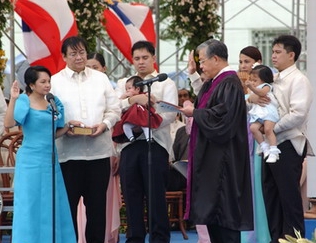
On June 30, 2004, breaking with tradition, President Arroyo delivered her inaugural speech at the Quirino Grandstand in Manila before departing for Cebu City for her oath-taking. This marked the first time a Philippine president took the oath of office outside of Luzon, a gesture of gratitude for the strong support she received from the people of Cebu during the election.
Allegations of cheating against Arroyo gained significant momentum a year after the May 2004 elections. On June 10, 2005, Samuel Ong, a former deputy director of the National Bureau of Investigation (NBI), claimed to possess audio recordings of wiretapped conversations between Arroyo and an official from the Commission on Elections (COMELEC). The official was later identified as former COMELEC commissioner Virgilio Garcillano. According to Ong, these recordings allegedly proved that Arroyo ordered the rigging of the national elections to secure a victory by approximately 1 M votes over Fernando Poe, Jr..
This revelation sparked the Hello Garci controversy, triggering widespread protests against Arroyo's administration. Several key members of her cabinet resigned and urged her to follow suit. On June 27, 2005, Arroyo publicly admitted to inappropriately speaking with a COMELEC official, characterizing it as a "lapse in judgment." However, she adamantly denied influencing the election outcome, asserting that she won fairly. Despite mounting pressure from various sectors of society, Arroyo refused to resign.
The Hello Garci controversy became the basis for an impeachment case filed against Arroyo in 2005, but these attempts failed later that year. Another impeachment case was filed in 2006, but it was also defeated in the House of Representatives. In October 2007, lawyer Alan Paguia filed another impeachment complaint against Arroyo, citing allegations of bribery. Paguia's complaint was based on the revelation by Pampanga Governor Ed Panlilio that various governors had received 500.00 K PHP from Malacañang.
6.3.2. Economy
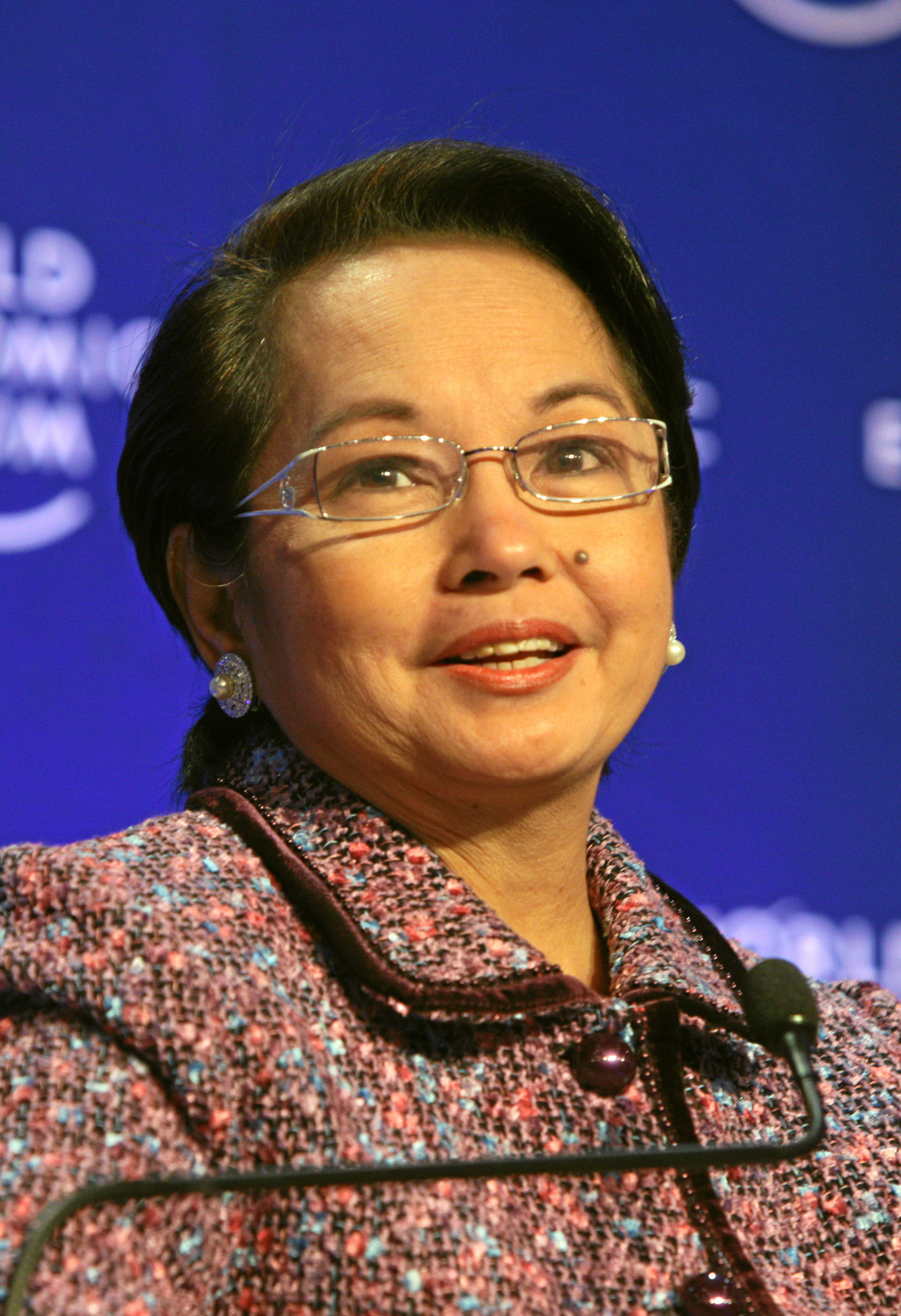
As an economist with a master's degree and a doctorate in the field, Gloria Macapagal-Arroyo made the Philippine economy the central focus of her presidency. During her administration, the annual economic growth in the Philippines averaged 4.5%, with expansion recorded in every quarter of her presidency. This performance surpassed that of her three immediate predecessors: Corazon Aquino (3.8%), Fidel Ramos (3.7%), and Joseph Estrada (3.7%). In 2007, the Philippine economy achieved its fastest growth in three decades, with real GDP growth exceeding 7%.
The economy proved resilient during the 2008 global financial crisis, performing better than many of its regional peers. This resilience was attributed to minimal exposure to troubled international securities, lower dependence on exports, relatively robust domestic consumption, substantial remittances from four to five million overseas Filipino workers, and a thriving business process outsourcing industry. Former U.S. President Bill Clinton praised Arroyo's handling of the economy, citing her "tough decisions" that helped stabilize the Philippine economy. However, despite this overall growth, the poverty rate remained stagnant due to an uneven distribution of income, indicating that the economic benefits did not uniformly reach all segments of society.
A controversial expanded value added tax (e-VAT) law, considered a cornerstone of the Arroyo administration's economic reform agenda, was implemented in November 2005. This measure aimed to bolster revenue-raising efforts and address the country's significant budget deficit. The tax reform boosted confidence in the government's fiscal capacity and contributed to the strengthening of the Philippine peso, making it East Asia's best-performing currency in 2005-2006. The peso further strengthened by nearly 20% in 2007, becoming one of Asia's top-performing currencies that year, a fact attributed to a combination of increased remittances from overseas Filipino workers and a strong domestic economy.
Early in her presidency, Arroyo introduced the "holiday economics" policy, a controversial initiative that adjusted public holidays to create longer weekends. The primary goal of this policy was to boost domestic tourism and provide Filipinos with more time to spend with their families. While intended to stimulate the economy through increased travel and leisure, the policy faced criticism from various sectors, including businesses and labor groups, who cited concerns about lost productivity and the disruption of traditional holiday observances.
6.3.3. Domestic Policies
The Arroyo administration implemented various domestic policies aimed at national development and social welfare. One notable initiative was the "holiday economics" policy, which aimed to boost domestic tourism by adjusting official holidays to create longer weekends.
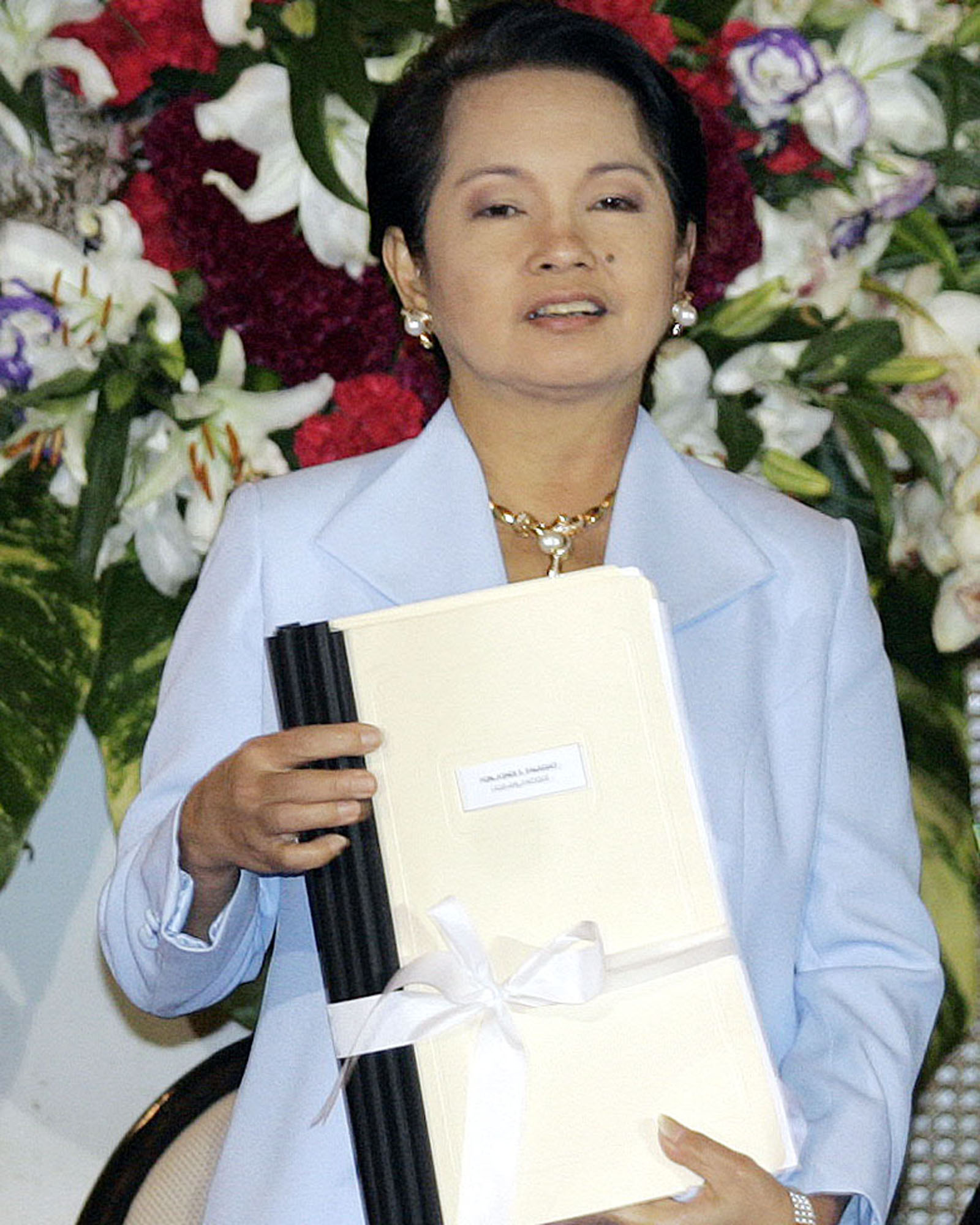
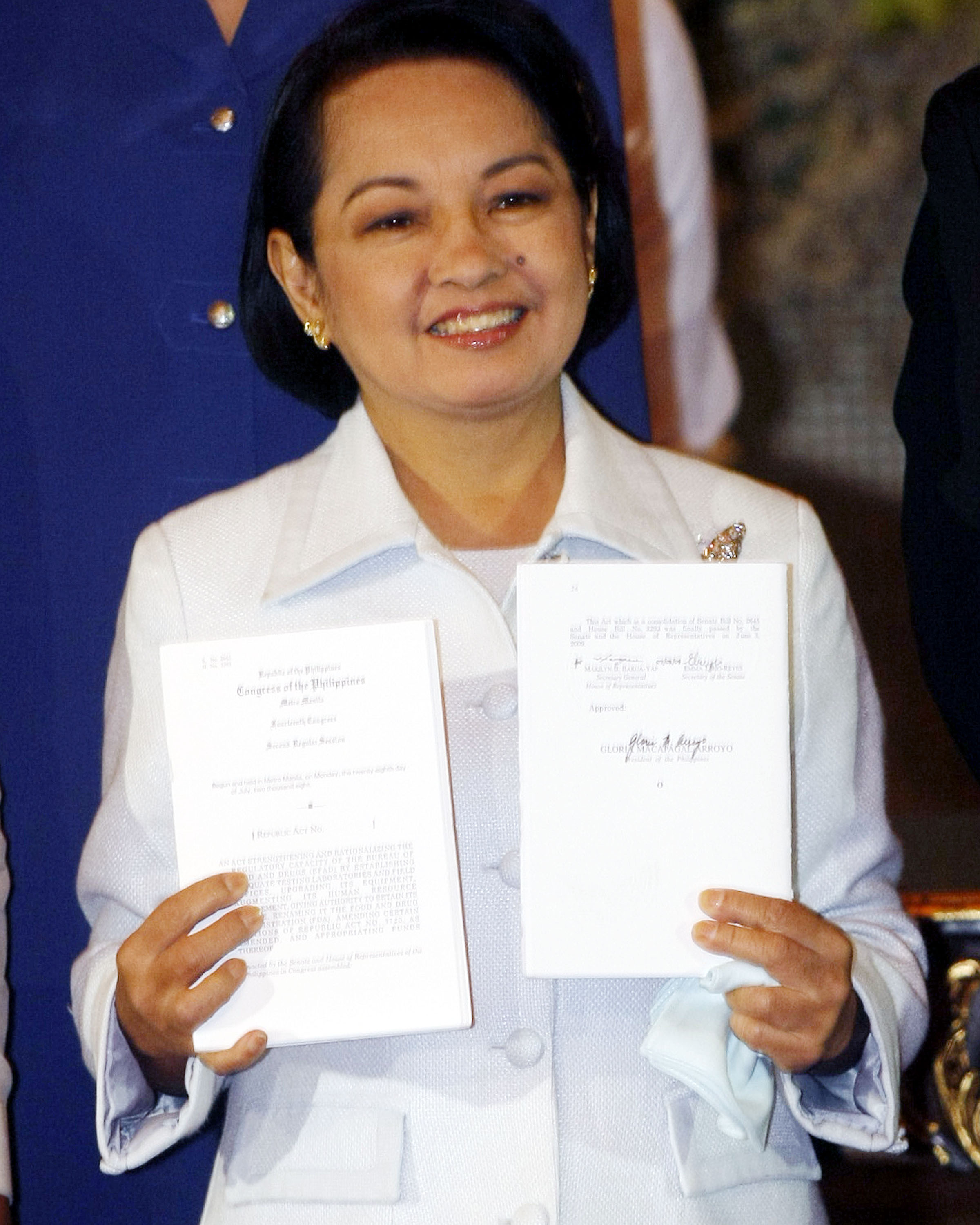
6.3.4. Foreign Policies

In July 2002, President Arroyo took on the additional role of Foreign Minister. Her administration's foreign policy was characterized by efforts to strengthen diplomatic ties and address regional and global challenges. The Philippines, under Arroyo, was one of the few countries to support the Iraq War in 2003. She engaged in bilateral meetings with various world leaders, including Mahathir Mohamad, the Prime Minister of Malaysia, and Junichiro Koizumi, the Prime Minister of Japan, during a visit to Tokyo in May 2002. She also met with U.S. President George W. Bush in May 2003, highlighting the strong relationship between the two countries.

Her foreign engagements continued to expand throughout her tenure, fostering diplomatic relations across various continents.
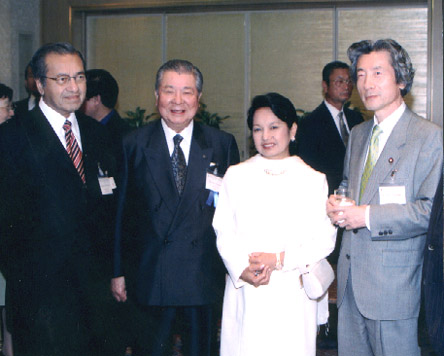
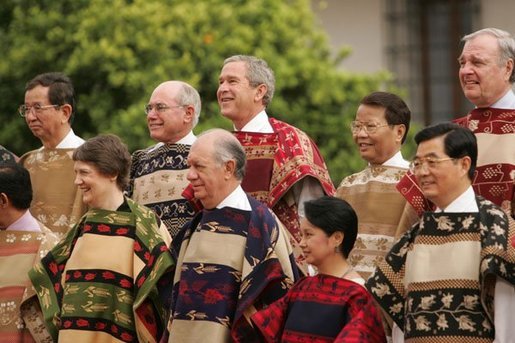
Arroyo's administration actively participated in international forums and strengthened ties with various nations.

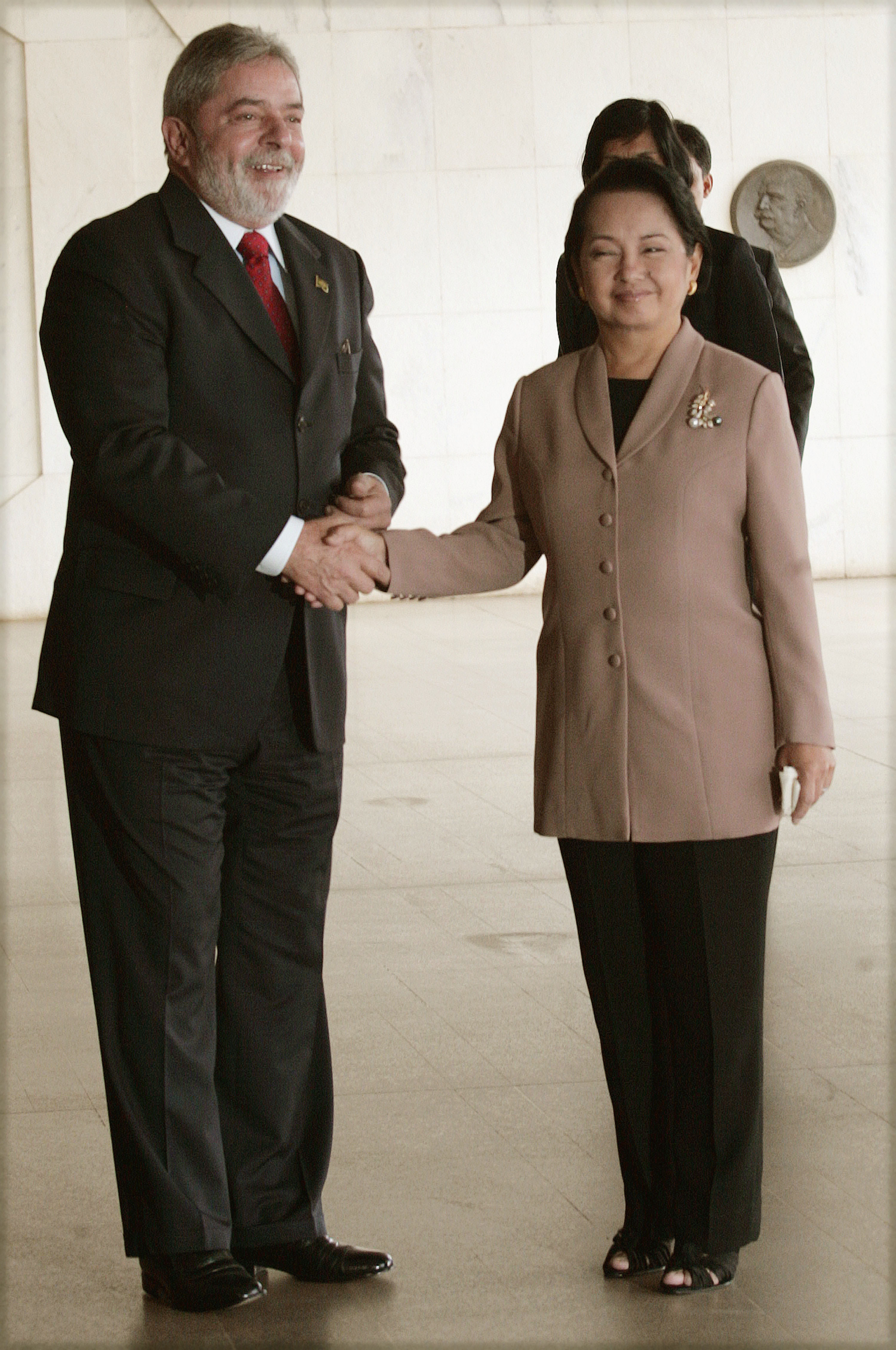
She consistently pursued a foreign policy that aimed to elevate the Philippines' standing on the global stage.

6.3.5. Administration and Cabinet
The Arroyo administration saw various changes in its cabinet and administrative structure throughout her two terms. She appointed several key figures to important positions, facing both praise and criticism for her choices. Her government's stability was frequently tested by political challenges and controversies, which often led to reshuffles within her cabinet as she sought to maintain public trust and political support.
6.3.6. State of Emergency (2006)

On February 24, 2006, authorities uncovered an alleged plot to overthrow the government, purportedly led by General Danilo Lim and other right-wing military elements. General Lim and some of his associates were arrested. In response to this perceived threat, President Arroyo issued Presidential Proclamation 1017, declaring a state of emergency throughout the Philippines. According to Arroyo, this declaration was necessary to suppress the military rebellion, curb lawless violence, and promote peace and stability.
Presidential Proclamation 1017 also granted the government powers to enforce warrantless arrests and take over strategic private utility companies. Several members of the Senate, including Franklin Drilon, Francis Pangilinan, and Pia Cayetano, condemned the proclamation, arguing that it contravened "the fundamental guarantees of the Constitution, particularly the basic civil liberties enshrined therein."
The state of emergency remained in effect for approximately one week, during which police and military forces dispersed demonstrators and protesters, particularly those gathered along EDSA. In addition to General Lim, other prominent figures were arrested in connection with their alleged involvement in the attempt to overthrow the government.
Presidential Proclamation 1017 was lifted on March 3, 2006. However, members of the opposition, private lawyers, and concerned citizens challenged its constitutionality before the Supreme Court. On May 4, the high court declared the proclamation constitutional, but crucially, it also ruled that it was illegal for the government to implement warrantless arrests and seize private institutions and companies without due process.
6.3.7. Charter Change
President Arroyo spearheaded a controversial plan for a comprehensive overhaul of the Philippine constitution. The primary objective of this initiative was to transform the existing unitary and presidential republic, which features a bicameral legislature, into a federal parliamentary government with a unicameral legislature. These proposals aimed to decentralize power and streamline the legislative process, but they also sparked considerable debate and opposition regarding their potential societal and political implications.
6.3.8. K-12 Curriculum Implementation
After decades of surveys, consultations, and studies dating back to the Monroe Survey in 1925 during the American period, the nine-year implementation process of the K-12 curriculum finally began during the Arroyo administration. On May 20, 2008, Senator Mar Roxas filed the Omnibus Education Reform Act of 2008 (Senate Bill 2294). This bill aimed to strengthen the Philippine education system through timely interventions focused on teacher quality, the medium of instruction, and the evaluation of student aptitude, among other aspects. It mandated the effectiveness of K-12 four years later, on April 24, 2012, during the administration of Arroyo's successor, Benigno Aquino III, with the goal of increasing the number of years in basic education from 10 to 12, consistent with global standards.
On January 7, 2010, Senator and presidential candidate Benigno Aquino III publicly adopted the position outlined in Senate Bill 2294. He stated that this reform would "give everyone an equal chance to succeed" and provide access to "quality education and profitable jobs."
6.3.9. Public Perception and Approval Ratings
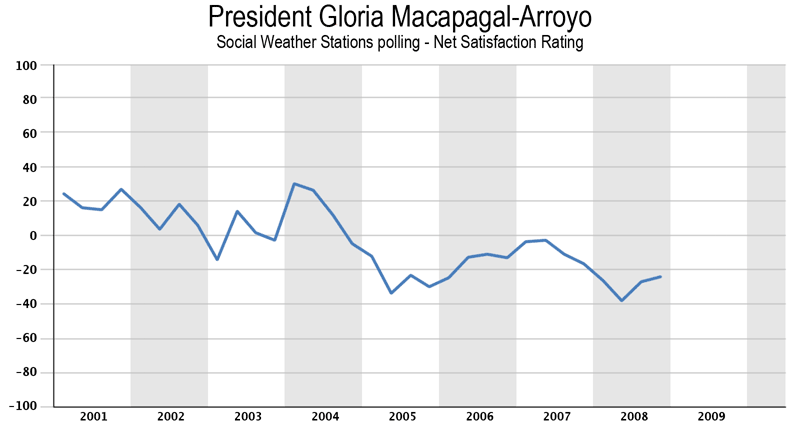
The Social Weather Stations (SWS) public opinion group regularly conducted quarterly surveys to track the net satisfaction rating (calculated as "satisfied" rating minus "dissatisfied" rating) of President Arroyo. She began her presidency in the first quarter of 2001 with a net satisfaction rating of +24. Her rating first dipped into negative territory in the first quarter of 2003, making her the only president to achieve a negative net satisfaction rating in SWS opinion polling up to that point.
Her rating rebounded positively in 2004, coinciding with the presidential election where she won a new six-year term. However, net satisfaction declined back into negative territory in the fourth quarter of 2004 and largely remained negative throughout the remainder of her presidency. Her rating plummeted to as low as -38 in the second quarter of 2008, and reached -53 in March 2010, making her one of the most unpopular presidents in the country since democracy was restored in 1986.
| Date | Rating |
|---|---|
| Mar 2001 | +24 |
| Apr 2001 | +17 |
| May 2001 | +18 |
| Jul 2001 | +16 |
| Sep 2001 | +15 |
| Nov 2001 | +27 |
| Mar 2002 | +16 |
| May 2002 | +4 |
| Aug 2002 | +28 |
| Sep 2002 | +18 |
| Nov 2002 | +6 |
| Mar 2003 | -14 |
| Jun 2003 | +14 |
| Sep 2003 | +2 |
| Nov 2003 | -3 |
| Jan 2004 | +8 |
| Feb 2004 | +15 |
| Mar 2004 | +30 |
| Jun 2004 | +26 |
| Aug 2004 | +12 |
| Oct 2004 | -6 |
| Dec 2004 | -5 |
| Mar 2005 | -12 |
| May 2005 | -33 |
| Aug 2005 | -23 |
| Dec 2005 | -30 |
| Mar 2006 | -25 |
| Jun 2006 | -13 |
| Sep 2006 | -11 |
| Nov 2006 | -13 |
| Feb 2007 | -4 |
| Jun 2007 | -3 |
| Sep 2007 | -11 |
| Dec 2007 | -16 |
| Mar 2008 | -26 |
| Jun 2008 | -38 |
| Jul 2008 | -50 |
| Sep 2008 | -27 |
| Dec 2008 | -24 |
| Feb 2009 | -32 |
| Jun 2009 | -34 |
| Sep 2009 | -38 |
| Dec 2009 | -38 |
| Mar 2010 | -53 |
| Jun 2010 | -17 |
| Average | -7 |
7. Post-Presidency
After concluding her presidential term on June 30, 2010, Gloria Macapagal-Arroyo remained active in Philippine politics, returning to the legislative branch and facing significant legal challenges.
7.1. House of Representatives (2010-2019)
In November 2009, Arroyo formally announced her intention to run for a seat in the House of Representatives of the Philippines, representing the 2nd district of Pampanga. This made her the second Philippine president, after Jose P. Laurel, to seek a lower office after the expiration of their presidency. A petition to disqualify her from the race was dismissed by the Commission on Elections (COMELEC) for lack of merit, a decision later affirmed by the Supreme Court. With minimal serious competition, she was elected to Congress in May 2010 with a landslide victory. After receiving final military honors at the inauguration ceremony of incoming President Benigno Aquino III, she proceeded directly to San Fernando, Pampanga, for her own oath-taking as congresswoman.
Despite being considered a strong contender for Speaker of the House, Arroyo declined to pursue the position, expressing a desire to take on a role akin to Sonia Gandhi, who wielded influence as merely the head of her party. On her first day as a lawmaker, Arroyo and her son, Dato, filed a resolution advocating for Congress to convene a constitutional convention to propose amendments to the existing constitution.
While still confined at the Veterans Memorial Medical Center under hospital arrest, Arroyo successfully secured a second term as congresswoman for Pampanga's second congressional district in the 2013 Philippine mid-term elections on May 13, 2013, defeating the ruling Liberal Party's Vivian Dabu. She was re-elected in 2016 for her third consecutive term, running unopposed.
During her speakership, in January 2019, the House passed a bill that lowered the age of criminal liability to twelve years old. Her leadership also spearheaded changes to House rules regarding Statements of Assets, Liabilities, and Net Worth (SALNs), requiring a 300 PHP fee for access. This meant that obtaining the SALNs of all 291 members of the House of Representatives would cost 87.30 K PHP, making it difficult for the poor to monitor potential corruption within the House. In February 2019, Senator Panfilo Lacson accused Arroyo of adding an additional 60.00 M PHP to 160.00 M PHP in "pork barrel" funds to the national budget.
7.2. Legal Issues and Arrest
Following her presidency, Gloria Macapagal-Arroyo faced a series of significant legal challenges, including charges of electoral sabotage and misuse of state funds.
In early 2011, Arroyo was diagnosed with cervical spondylosis, also known as cervical radiculopathy. She was rushed to the St. Luke's Medical Center in Taguig on July 25, 2011, shortly after the State of the Nation Address by then-President Benigno Aquino III. Doctors performed a five-hour spine surgery on July 29, 2011, followed by two more surgeries in August 2011, which exacerbated her hypoparathyroidism. Despite a Department of Justice hold departure order, the House of Representatives, under Speaker Feliciano Belmonte, Jr., issued a travel permit for her to seek treatment in Germany.
However, Arroyo was arrested on November 18, 2011, after a Pasay court issued a warrant for her arrest following the filing of a complaint for electoral sabotage by the COMELEC. The warrant was served at St. Luke's Medical Center, where she was confined. Days earlier, the Supreme Court had issued a resolution enjoining attempts by the Department of Justice to prevent her from leaving the Philippines for medical treatment overseas. She was transferred to the Veterans Memorial Medical Center in Quezon City on December 9, 2011. She was eventually released from hospital arrest on bail on July 25, 2012, with the electoral sabotage charges later dropped due to lack of evidence.
In October 2012, she was rearrested on charges of misuse of 8.80 M USD in state lottery funds during her term in office, to which she refused to enter any plea. She remained under hospital arrest due to life-threatening health conditions. Throughout 2014, she experienced several medical incidents, including bladder problems and choking on a broccoli stem, which led to her being rushed to St. Luke's for treatment before returning to confinement at the Veterans Medical Center. Her attorneys renewed their application for bail following these incidents.
In a case filed by human rights lawyer Amal Clooney, the United Nations Working Group on Arbitrary Detention declared Arroyo's hospital detention arbitrary and a violation of international human rights law in October 2015. The group recognized that the charges against Arroyo were politically motivated, stemming from her exercise of the right to participate in government, and deemed her detention arbitrary and illegal under international law because the Sandiganbayan court repeatedly denied her bail without adequately considering her individual circumstances.
On July 19, 2016, a few weeks after Rodrigo Duterte was sworn in as president, the Supreme Court ruled in favor of dismissing the plunder case against Arroyo, with an 11-4 vote. This decision led to her release from the hospital, where she had been detained since 2011. Additionally, the Supreme Court declared the Department of Justice's "hold departure orders" unconstitutional. Following her acquittal, Arroyo's lawyers stated that she no longer required her medical paraphernalia.
7.3. House of Representatives (2022-present)

Gloria Macapagal-Arroyo emerged from political retirement to seek a comeback to the House of Representatives in the 2022 Philippine House of Representatives elections. She ran unopposed for the 2nd district of Pampanga, with her legal counsel, Peter Paul Magalang, filing the certificate of candidacy on her behalf.
During her campaign, she publicly declared her support for the candidacies of Bongbong Marcos for president and her new Lakas party-mate Sara Duterte for vice president, actively joining the caravans and campaign sorties of their UniTeam Alliance. On May 10, 2022, Arroyo was proclaimed as the representative of the 2nd district of Pampanga, succeeding her son Mikey once again for her fourth non-consecutive term. Although she officially assumed office on June 30, 2022, she took her oath of office on May 26 in Lubao and again on June 13 before outgoing President Rodrigo Duterte at Malacañang Palace.
Arroyo stated her commitment to joining her fellow representatives in passing the legislative agenda of the administration of President Bongbong Marcos and continuing to advocate for projects aligned with the Pampanga Megalopolis program. She initially aimed to regain the House speakership in the 19th Congress after Marcos's election but later rescinded this ambition upon realizing that Marcos preferred his cousin and her Lakas party-mate, Representative Martin Romualdez (Leyte-1st), to become the next House Speaker. She subsequently endorsed Romualdez's bid for the speakership.
7.4. Leadership Positions in the House
On July 25, 2022, Arroyo was appointed as Senior Deputy Speaker of the House of Representatives under the new speakership of Martin Romualdez in the 19th Congress. She also became a member of President Bongbong Marcos's delegation for his international trips, starting with his working visit to Thailand in November 2022 for the 2022 Asia-Pacific Economic Cooperation summit. Marcos publicly referred to her as his "secret weapon." She subsequently joined him on visits to Belgium, China, Davos in Switzerland, Japan, the United States, and Indonesia. In December 2022, her only daughter, Evangelina Lourdes Arroyo-Bernas, was appointed as the country's ambassador to Austria. Arroyo defended this appointment against accusations of nepotism, citing her daughter's qualifications.

On May 17, 2023, the House leadership demoted Arroyo from Senior Deputy Speaker to a regular Deputy Speaker, stating the change was to "unburden her heavy workload" associated with the senior title. She effectively swapped positions with fellow Pampanga Representative Aurelio Gonzales Jr. of the 3rd district. Later, on November 7, 2023, she was removed from her position as a Deputy House Speaker. This removal occurred after she failed to support a resolution aimed at upholding the House's "dignity, integrity and independence" and supporting Speaker Martin Romualdez's leadership, as she was abroad when the resolution was signed. Her removal followed criticism from her political ally, former President Rodrigo Duterte, who had objected to the House's decision to reallocate confidential funds originally designated for the offices of his daughter, Vice President and concurrent Education Secretary Sara Duterte. Arroyo was replaced by Representative Tonypet Albano (Isabela-1st).
Arroyo is running unopposed for re-election as Pampanga's 2nd district representative in 2025.
7.5. Political Retirement and Advisory
Although not holding an elective position immediately after her 2019 congressional term, Arroyo remained involved as a member of Lakas-CMD. As of June 2019, she was reportedly working on a memoir detailing her experiences as president, which she planned to limit to 200 pages for the general public. On November 26, 2020, President Rodrigo Duterte appointed Arroyo as presidential adviser on Clark programs and projects, indicating her continued influence in government affairs.
8. Personal Life
Gloria Macapagal-Arroyo married lawyer and businessman Jose Miguel Arroyo of Binalbagan, Negros Occidental, in 1968. They had met during her teenage years. Together, they have three children:
- Juan Miguel (born 1969), also known as Mikey Arroyo.
- Evangelina Lourdes (born 1971), also known as Luli Arroyo-Bernas, who was appointed as the Philippine ambassador to Austria in December 2022.
- Diosdado Ignacio Jose Maria (born 1974), also known as Dato Arroyo.

9. Scouting Activities
Gloria Macapagal-Arroyo served as the second Chief Girl Scout of the Girl Scouts of the Philippines.
10. Assessment and Legacy
Gloria Macapagal-Arroyo's presidency and political career have been subject to varied assessments, with both notable achievements and significant criticisms.
10.1. Assessment and Historical Impact
Arroyo outlined her vision for the Philippines as "building a strong republic" throughout her tenure. Her agenda focused on establishing a robust bureaucracy, reducing crime rates, enhancing tax collection, fostering economic growth, and intensifying efforts against terrorism. Her administration saw consistent economic growth, notably avoiding contraction during the 2008 global financial crisis, a performance that earned praise from international figures like former U.S. President Bill Clinton. The implementation of the e-VAT law and the strengthening of the Philippine peso were also significant economic achievements.
She made history as the first female Vice President and the second female President of the Philippines, following Corazon Aquino. Her return to the House of Representatives and subsequent election as the first female Speaker of the House further solidified her unique position in Philippine politics. Her efforts to introduce the K-12 curriculum, though fully implemented by her successor, laid the groundwork for a significant educational reform aimed at aligning the Philippine education system with global standards.
10.2. Criticism and Controversies
Despite her achievements, Arroyo's political career was marred by numerous criticisms and controversies, which significantly impacted her public perception and legacy.
One of the most enduring controversies was the Hello Garci scandal in 2005, where she was accused of rigging the 2004 presidential election. Her admission of an "inappropriate" phone call with a COMELEC official, though she denied influencing the outcome, led to widespread protests, cabinet resignations, and multiple failed impeachment attempts. This scandal severely eroded public trust and contributed to persistently low approval ratings throughout her second term.
Her administration also faced allegations of corruption, including the Fertilizer Fund scam, where funds intended for farmers were allegedly diverted, and the NBN/ZTE scandal, involving alleged kickbacks in a national broadband project. Her husband, Jose Miguel Arroyo, was also implicated in a scandal involving alleged illicit campaign funds under the alias "Jose Pidal."
The declaration of a state of emergency in 2006, in response to an alleged coup plot, drew strong condemnation from senators and human rights advocates who argued it infringed upon civil liberties through warrantless arrests and the potential takeover of private utilities. Although the Supreme Court largely upheld the proclamation, it ruled against the legality of warrantless arrests and seizures.
Other notable controversies and incidents during her presidency included the Oakwood mutiny in 2003, the Hacienda Luisita massacre in 2004, the 2004 SuperFerry 14 bombing, the Manila Peninsula siege in 2007, and the Maguindanao massacre in 2009. Her "holiday economics" policy, while intended to boost tourism, was criticized by businesses for disrupting productivity.
In her post-presidency, Arroyo faced charges of electoral sabotage and misuse of state lottery funds, leading to her hospital arrest for several years. While she was eventually acquitted by the Supreme Court, these legal battles highlighted persistent concerns about accountability and the rule of law. Her later actions as House Speaker, such as lowering the age of criminal liability and making access to lawmakers' SALNs more difficult, also drew public criticism regarding their social impact and transparency implications. Allegations of "pork barrel" insertions in the national budget further fueled public discontent.
The stagnant poverty rate despite economic growth during her presidency also remains a point of criticism, indicating that the benefits of economic expansion were not equitably distributed across society.
11. Honors and Awards
Throughout her distinguished career, Gloria Macapagal-Arroyo has received numerous honors, awards, and honorary degrees from domestic and international institutions, recognizing her contributions to public service and academia.
11.1. Foreign Honors
- Brunei: Member of the Family Order of Laila Utama
- Dominican Republic: Grand Cross Special Class of the Order of Merit of Duarte, Sánchez and Mella
- Equatorial Guinea: Grand Cross of the Order of Independence

- Holy See: Recipient of the Pro Ecclesia et Pontifice

- Japan: Grand Cordon of the Order of the Chrysanthemum
- Romania: Collar of the Order of the Star of Romania
- Spain: Dame of the Collar of the Order of Isabella the Catholic
11.2. Honorary Degrees
- Honorary Doctor of Laws degree from La Trobe University in Australia (2000)
- Honorary Doctor of Laws degree from Waseda University in Tokyo, Japan (2002)
- Honorary Doctor of Laws degree from Old Dominion University in Virginia, United States (2003)
- Honorary Doctor of Laws degree from Fordham University (2003)
- Honorary Doctor of Humane Letters degree from University of San Francisco in California, United States (2004)
- Honorary Doctor of Humanities degree from Mapua Institute of Technology in Manila, Philippines (2004)
- Honorary Doctor of Laws degree from Kyungsung University in Pusan, South Korea (2005)
- Honorary Doctor of Laws degree from Chulalongkorn University in Bangkok, Thailand
11.3. Other Recognitions
- Time magazine's "People Who Mattered" list for 2005
- Forbes magazine's 100 Most Powerful Woman in the World (from 2004 to 2009), ranking 4th in the 2005 list
- Member, Council of Women World Leaders
- Don Quijote International Award (category: mejor labor institucional - Best institutional work) from Spain's King Juan Carlos (April 15, 2010)
- Teodora Alonzo Award by the Philippine Order of the Knights of Rizal
- Fourth Patron of the Royal Institution Singapore
12. External Links
- [https://www.congress.gov.ph/members/search.php?id=macapagal-arroyo&congress=15 House Of Representatives - The 15th Congress - Member Profile]
- [http://www.gloriamarroyo.ph President Gloria Macapagal Arroyo official website]
- [http://www.gmanetwork.com/news/video/15102/reporter-s-notebook-ang-palasyo-reporter-s-notebook-special Reporter's Notebook: Ang Palasyo Reporter's Notebook Special, December 4, 2007]
- [http://www.abs-cbnnews.com/-depth/11/18/11/interactive-timeline-gloria-macapagal-arroyo Interactive timeline: The life of Gloria Arroyo, by abs-cbnNEWS.com]
- [http://www.op.gov.ph/ Office of the President of the Philippines]
- [http://www.gloriaarroyo.net Gloria Arroyo Fan site]
- [http://www.kgma.org Gloria Macapagal-Arroyo official website]
- [http://www.gloria-arroyo.com Gloria Arroyo fan site]
- [http://www.mofa.go.jp/mofaj/area/philippines/cv/r_arroyo.html Arroyo Presidential Biography (Ministry of Foreign Affairs)]
- [http://www.gloriaarroyo.com Gloria Macapagal-Arroyo Forum]




